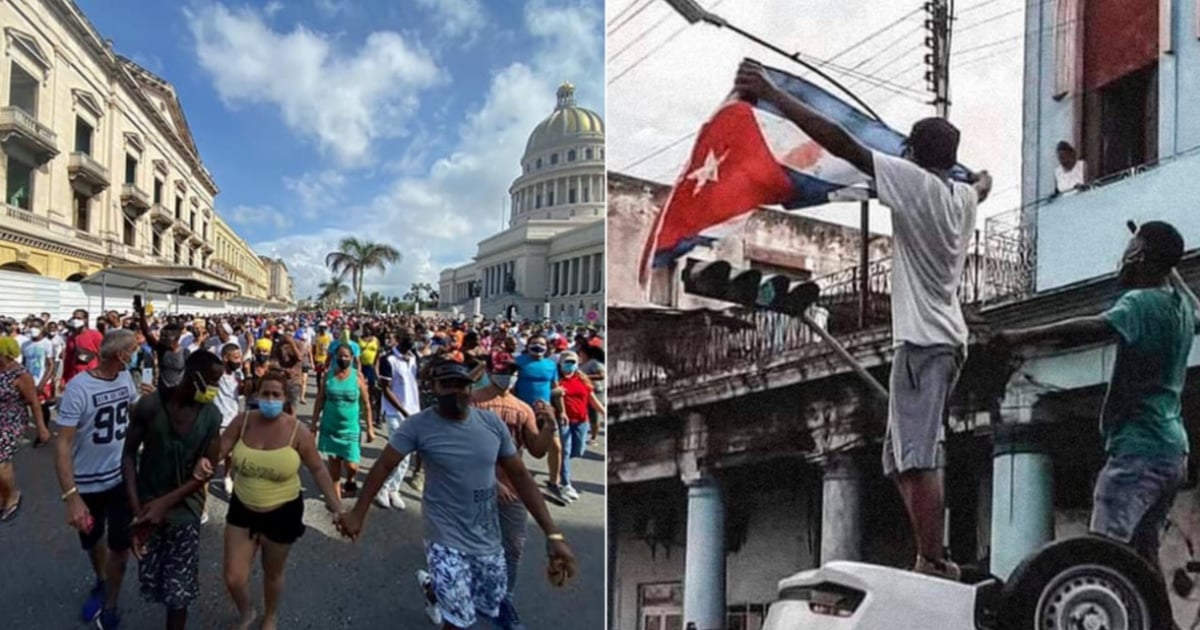This July 11 marks the third anniversary of the historic protests for freedom in Cuba. In the early summer days of 2021, Cubans took to the streets across the nation, fed up with a life of sacrifice, scarcity, and resistance. From those massive protests against Raúl Castro's Communist Party, 600 demonstrators remain imprisoned out of the 1,500 detained for peacefully defending their dream of freedom. Among the incarcerated are leaders of the San Isidro Movement, Luis Manuel Otero Alcántara and Maykel Osorbo, as well as Unpacu's José Daniel Ferrer.
Those historic protests did not achieve the goal of restoring democratic normalcy to the largest of the Antilles. Quite the opposite, today's situation is incredibly more difficult and precarious. The disillusionment has translated into a mass migration wave that has caused the country to lose 18% of its population between 2022 and 2023. Many fled in fear of being arrested. The island is on the brink of what economists are calling the "Haitianization of Cuba." Some think tanks even openly discuss that the country is now a failed state. And the worst is yet to come.
Current State of Affairs in Cuba
The regime of Miguel Díaz-Canel is prepared to suppress new protests this summer, just as it did on July 11 by calling on communists to confront peaceful demonstrators. These anticipated uprisings come amid continuous blackouts due to a lack of funds to buy fuel; hyperinflation, which closed May with a 31% year-on-year increase; a government unable to control the exchange rate; and public services, like healthcare, undergoing the worst crisis in their history due to lack of investments, which have primarily been diverted to bolster the police and repressive machinery.
According to Cubalex, an NGO monitoring human rights in the island, "the causes that triggered the social explosion of 2021 remain, showing an alarming panorama of repression and severe human rights violations." They understand that this is why there is harassment of civil society, to prevent participation in political life and the transformation of the country. The regime achieves this through the criminalization of any attempt to exercise rights on the island, leaving those who disagree with no other option but to leave. The forced exile of activists like Omara Ruiz Urquiola, who has unsuccessfully tried to return to the country, shows the path for those who might attempt to follow in her footsteps. Since July 2022, according to Cubalex, at least 22 people have been forced to leave Cuba, 39 have been threatened with imprisonment, and 11 have been prevented from returning to the island.
To commemorate the political prisoners of July 11, the Inter-American Commission on Human Rights, an OAS (Organization of American States) body created to monitor and defend human rights, plans to hold a thematic hearing in Washington this Thursday (11:00 AM) to discuss state violence patterns on the island. Many Cubans have taken to social media to remember those historic protests from three years ago, as well as those who are still behind bars. The images of repression are chilling to a population burdened by hunger, soaring prices, and the bleak admission by Cuban leader Miguel Díaz-Canel that the country is living in a war economy.
Meanwhile, the regime focuses its efforts on controlling not only those inside the island but also those outside. To this end, it has approved three laws on Foreigners, Migration, and Citizenship designed to intimidate those living in exile who have come out of anonymity to protest openly in front of Cuban consulates worldwide.
This was something the July 11 protests achieved, bringing out thousands of Cubans who remained silent out of fear of eternal exile or to protect their families. It also led many powerful voices on the international left to turn their backs on the regime, and institutions like the European Parliament to ban the entry of Castro supporters into their premises. The July 11 protests were not in vain.
Key Questions About the July 11 Protests in Cuba
To provide a deeper understanding of the July 11 protests and their aftermath, here are some frequently asked questions and their answers:
What triggered the July 11 protests in Cuba?
The July 11 protests were triggered by widespread discontent with economic hardship, scarcity, and political repression under the Communist regime of Raúl Castro.
What has been the impact of the protests on Cuba's political landscape?
While the protests did not achieve democratic reforms, they exposed the regime's vulnerabilities and led to increased international scrutiny. They also spurred a wave of emigration and ongoing civil unrest.
How has the Cuban government responded to the protests?
The Cuban government responded with severe repression, including mass arrests, imprisonment of protest leaders, and increased surveillance and control measures both inside and outside the island.
What is the current situation of those arrested during the protests?
Many of those arrested during the protests remain imprisoned. Human rights organizations continue to call for their release and highlight ongoing abuses and violations of their rights.
